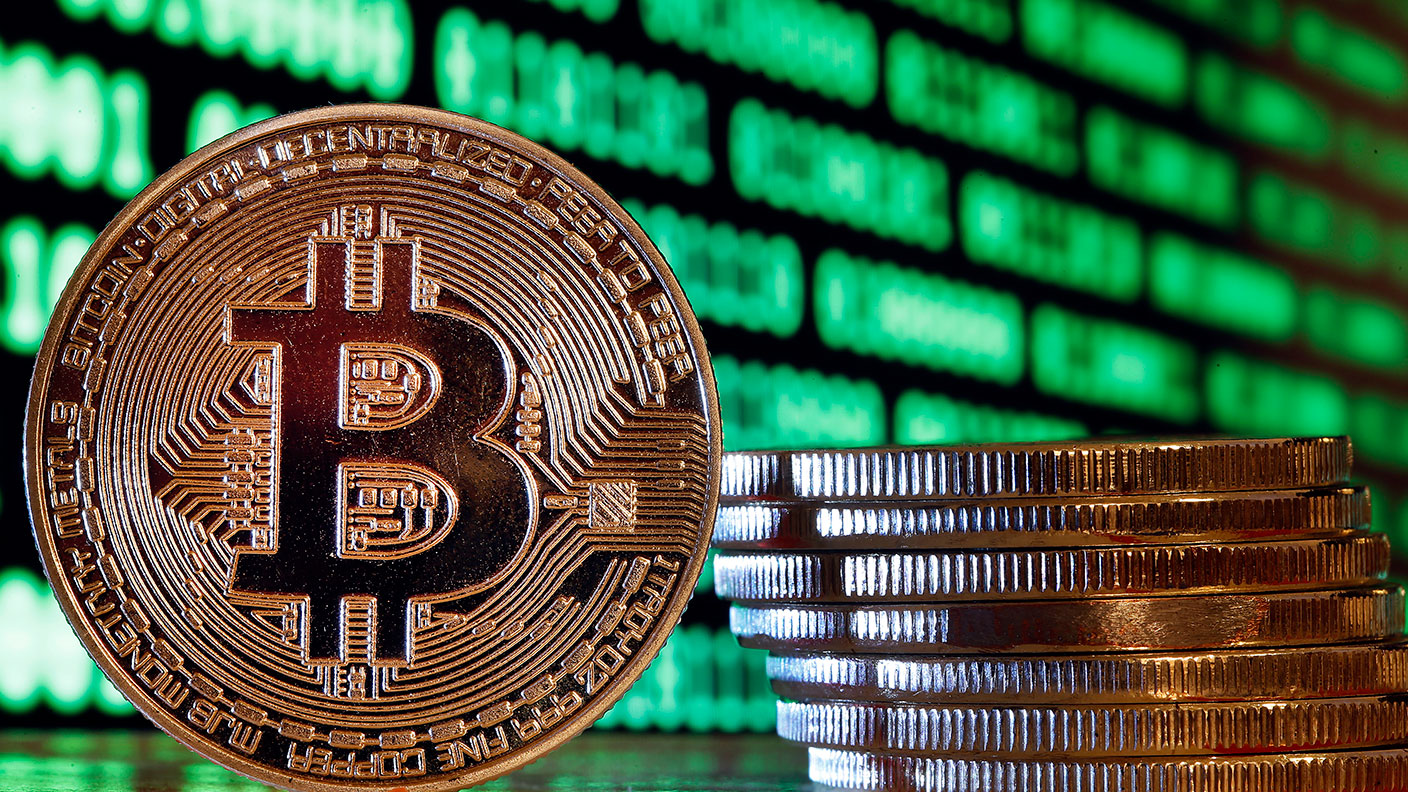The biggest long-term threat to bitcoin and cryptocurrencies
Cryptocurrencies have had a tough week, with bad news from China and Elon Musk's U-turn. But there’s a longer-term threat to their existence, says John Stepek. Here's what it is.


Get the latest financial news, insights and expert analysis from our award-winning MoneyWeek team, to help you understand what really matters when it comes to your finances.
You are now subscribed
Your newsletter sign-up was successful
Want to add more newsletters?

Twice daily
MoneyWeek
Get the latest financial news, insights and expert analysis from our award-winning MoneyWeek team, to help you understand what really matters when it comes to your finances.

Four times a week
Look After My Bills
Sign up to our free money-saving newsletter, filled with the latest news and expert advice to help you find the best tips and deals for managing your bills. Start saving today!
Bitcoin has had a rough week.
This in itself is not surprising. It’s a volatile asset. This is what happens. Maybe this is another of its big bear markets. Maybe it’s a temporary pause.
My colleague Dominic had a look at the technicals during the crash, and I have to say, the levels he identified seem to have been borne out by events already.
MoneyWeek
Subscribe to MoneyWeek today and get your first six magazine issues absolutely FREE

Sign up to Money Morning
Don't miss the latest investment and personal finances news, market analysis, plus money-saving tips with our free twice-daily newsletter
Don't miss the latest investment and personal finances news, market analysis, plus money-saving tips with our free twice-daily newsletter
But there’s a longer-term threat to bitcoin and any other aspiring forms of independent currency out there.
Being an incumbent is a disadvantage when new technology storms a sector
Bitcoin is an asset that a lot of people feel very strongly about. As I’ve said before, it reminds me of gold in the 2000s.
On one side, you have its fans saying that it’s the cure for virtually every ill that ails us. On the other side, the bears argue that it’s a fad, it’s completely faith-based (as though everything else isn’t), and get wildly excited every time it falls by 10%, even although that’s a calm day by crypto standards.
My own view is somewhere in the middle (yes, that’s unusual for me). I think bitcoin pretty clearly has a value based on something more than blind hope. It’s an asset that is extremely easy to move across borders. That at the very least makes it worth something.
But I think bitcoin itself clearly faces a lot of formidable obstacles to being adopted more widely. User-friendliness is one. The sheer obtuseness and ropey nature of the surrounding infrastructure is very off-putting (eg, anyone who might have wanted to sell their cryptos during the crash this week might have struggled with their exchange).
A much bigger issue, though, is the government. Some bitcoin bears might just point and laugh at cryptocurrencies. But the authorities are taking it all rather more seriously.
The recent turmoil appears to have triggered some urgency from the Federal Reserve, for example. Fed boss Jerome Powell put out what the FT describes as “a rare video statement” talking about a “central bank digital currencies”. In short, the Fed appears to be accelerating its work on a digital dollar.
Given that China’s digital yuan already exists, it may seem odd that the US is apparently so far behind on this. But when it comes to today’s monetary system, the US dollar is the global reserve currency. In other words, the US is the incumbent.
If you look at what tends to happen in the business world, the incumbents are usually the last to react to any technological revolution. They squander their apparent advantages on ignoring or ridiculing the new advance.
There is a good reason for this. They have the most to lose. A big company or industry spends a great deal of time and financial and political capital on shoring up its moat via regulation, or brand building, or expensive infrastructure. The status quo represents a massive sunk cost for the incumbent.
The idea that new technology can simply render that moat irrelevant, or far smaller than it once was, is both terrifying and exhausting. So they prefer to attack the idea rather than accept the painful and risky strategy shifts that arise from its implications.
As a result, it’s only when the threat refuses to go away and threatens to become existential, that they belatedly play catch up.
Just look at the reaction of most big retailers to the internet and to Amazon. The winners are the ones who moved most rapidly to adapt (eg Next in the UK high street – and to be fair, Next had a head start because it already had a huge mail order business). The losers are those who didn’t (eg Marks & Spencer).
The authorities aren’t going to give up their monopoly on currency issuance
Anyway - they’re waking up now. What’s particularly interesting is that the Fed wasn’t really getting at bitcoin. The crypto sector that it really singled out was “stable coins”. These are crypto coins whose value is pegged to the dollar (or another currency).
I suppose you could view these as “shadow currencies”, in the same way that “shadow banks” offer services traditionally associated with banks (most importantly, lending money) but don’t fall under the same regulatory or monitoring structure.
As a result, you can get financial imbalances building up out of sight, and you only really find out about it when things go pear-shaped (shadow banking had a fair bit of involvement with the 2008 crash).
But of course the other reason the Fed might not like “stable coins” is that, unlike bitcoin, these actually have a fighting chance of becoming a medium of exchange to rival mainstream currencies.
And it’s not just the Fed that’s getting itchy about crypto. The Chinese government stuck its oar in earlier this week and is now telling citizens that they’ll be rewarded for shopping any suspected cryptocurrency miners to the authorities.
Meanwhile, back in the US, the government now wants crypto transfers worth more than $10,000 to be reported to the tax office.
And hanging over all this is the blanket cause of ESG (environmental social and governance) – whereby bitcoin is presented as a massive waste of energy and a “dirty” currency. The truth of all this probably depends a bit on your perspective (the same computer chips used for mining bitcoin are also used to play Call of Duty online – which is the waste of energy? And I say that as someone who’s partial to a video computer game).
Anyway – the point is, the authorities have monopoly over currency issuance and there is no way they’re going to let a challenger walk in and take that from them. So whatever else happens in the crypto space on a day-to-day basis, this is the long-term threat to be aware of.
As for what it means for your portfolio – well, I still think it’s a good idea to familiarise yourself with bitcoin. But I do think it’s more important to hold a bit of gold in your portfolio. Apart from anything else, if the central banks are busy worrying about crypto, it’ll take them a lot longer to get round to banning precious metals.
For more on all these topics, subscribe to MoneyWeek magazine and get your first six issues free.
Get the latest financial news, insights and expert analysis from our award-winning MoneyWeek team, to help you understand what really matters when it comes to your finances.

-
 Should you buy an active ETF?
Should you buy an active ETF?ETFs are often mischaracterised as passive products, but they can be a convenient way to add active management to your portfolio
-
 Power up your pension before 5 April – easy ways to save before the tax year end
Power up your pension before 5 April – easy ways to save before the tax year endWith the end of the tax year looming, pension savers currently have a window to review and maximise what’s going into their retirement funds – we look at how
-
 How a dovish Federal Reserve could affect you
How a dovish Federal Reserve could affect youTrump’s pick for the US Federal Reserve is not so much of a yes-man as his rival, but interest rates will still come down quickly, says Cris Sholto Heaton
-
 'Investors should brace for Trump’s great inflation'
'Investors should brace for Trump’s great inflation'Opinion Donald Trump's actions against Federal Reserve chair Jerome Powell will likely stoke rising prices. Investors should prepare for the worst, says Matthew Lynn
-
 The challenge with currency hedging
The challenge with currency hedgingA weaker dollar will make currency hedges more appealing, but volatile rates may complicate the results
-
 What's behind the big shift in Japanese government bonds?
What's behind the big shift in Japanese government bonds?Rising long-term Japanese government bond yields point to growing nervousness about the future – and not just inflation
-
 Can Donald Trump fire Jay Powell – and what do his threats mean for investors?
Can Donald Trump fire Jay Powell – and what do his threats mean for investors?Donald Trump has been vocal in his criticism of Jerome "Jay" Powell, chairman of the Federal Reserve. What do his threats to fire him mean for markets and investors?
-
 Freetrade’s new easy-access funds aim to beat top savings rates
Freetrade’s new easy-access funds aim to beat top savings ratesFreetrade has launched an easy-access exchange traded fund (ETF) range - here’s how the ETFs work and how they compare to the savings market
-
 Go for value stocks to insure your portfolio against shocks, says James Montier
Go for value stocks to insure your portfolio against shocks, says James MontierInterview James Montier, at investment management group GMO, discusses value stocks and slow-burn Minsky moments with MoneyWeek.
-
 Halifax: House price slump continues as prices slide for the sixth consecutive month
Halifax: House price slump continues as prices slide for the sixth consecutive monthUK house prices fell again in September as buyers returned, but the slowdown was not as fast as anticipated, latest Halifax data shows. Where are house prices falling the most?